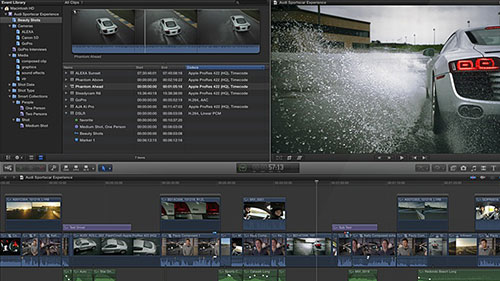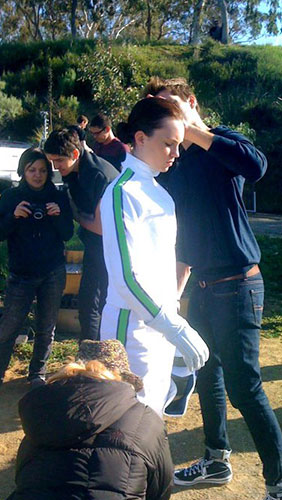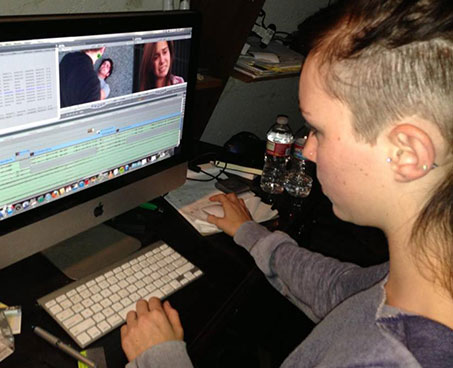While widely available and easily accessed technology makes success possible for self-trained video editors, digital saturation introduces a new set of challenges for editors. Consider this your crash course on how to become a video editor in the Digital Age, without any formal education.
Cameras and editing software are incredibly easy to obtain nowadays. This is mostly a positive thing. For those lacking the funds to attend film school or buy a RED kit, there are many opportunities to write, shoot, and edit. However, there is a downside. Before the proliferation of digital technology, there was no “undo” button: films had to be edited by hand and cut-by-cut. Now the margin for error on bad edits is very large; a better product is a single copied file away. As a result, artistry is downplayed while plentiful content production is emphasized.
You have to work diligently to prove that you’re not just another wannabe-editor. One way to do that is to get a degree. Compare an amateur to a degreed editor, and the latter has several advantages: skill, artistry, and connections. While college is a great thing and improves the lives of many, people are starting to realize that college just isn’t for everyone. Luckily, you don’t have to get a degree to become a pro.
CC Weske is an LA-based photographer and video editor who decided to take the path you’re on right now. She’s found that experience, passion, and adversity are effective teachers when it comes to succeeding as a self-trained, professional video editor. She was kind enough to share her career path with her, and we’ve built a guide for your based on her testimony. Here’s how to become a video editor and set yourself apart in a digital age.
Train for a Lifelong Career
The problem career-minded video editors face is that practically anyone can download editing software, play with it, and declare themselves editors. Without the right technical knowledge, you’ll be unrecognizable from the amateurs. Your first step in starting your video editing career is to train yourself. .
Of course, you’re not just competing against amateurs. You’re competing against degreed editors. Digital saturation may be the great equalizer, but the knowledge and skill disparity between you and college graduates is very real. Fortunately, there are several things you can do to prove you’re serious, catch up with the pros, and build a strong foundation for your career:
Take Software Courses: While you can teach yourself how to use editing programs, sometimes it’s best to get some formal training under your belt. For example, CC took an intensive course for Final Cut Pro 7, but taught herself everything else she needed to know. Taking that course fueled her passion and laid a solid foundation for launching her career.
Create Your Own Content: Your degreed coworkers are entering the field with solid portfolios; thanks to the work they did at school. However, you can catch up with them. Make good use of your smartphone, create your own video content, edit, and repeat. This is a great way to refine your craft and build a portfolio — both of which will open the doors to working on legitimate film projects.
Edit Anything and Everything: Once you’ve built a portfolio, work on any project coming your way. When CC was just starting out, she worked on everything from music videos, educational materials, feature films, workout videos, and TV shows. She ended up working with people from multiple backgrounds, and that allowed her to develop a unique style, build a wider range of editing skills, clearly define her interests, and open more doors.
Be A Lifelong Learner: When you finally start working on legitimate film projects, you’ll get to learn from some of the most talented artists you’ll ever meet. You’ll also have to teach yourself to use various editing programs, such as Adobe Premiere. The only way you’ll succeed in building a strong skill set under these intense conditions is to keep an open mind and learn from everyone around you.
Build Connections
Perhaps more than any other career, becoming a video editor is all about whom you know. When you enter the editing industry without a college background, you’re most likely entering the field without any contacts or networking opportunities. You and the amateur have that in common. What will make you different, though, is how you go about building your network of contacts.
In a digital age, there is always the temptation to rely heavily on social media and other networks to build your career. While you should certainly make online tools part of your networking arsenal, don’t rely on them completely. The key to building your network of contacts isn’t to be found online. It’s the quality of your work. Here are four ways you can use your labor to build an effective career network:
Work for Free: In this industry, you have to do a lot of work for free to get the work that pays. There’s no disguising that you’ll be living the “starving artist lifestyle” for a while. On the bright side, working for free is a great way to build connections, experience, and a reputation. If you go into every project, whether it’s paid or free, with a fired-up work ethic, people will take notice. You’ll build a great name for yourself that will lead to paid work from old contacts and new clients alike. On a related note…
Work Multiple Jobs: You can’t work for free all the time. When CC was just starting out, she was teaching fencing, baby sitting, and working as a hostess at a local restaurant. The obvious benefit to working multiple jobs is that you’re able to survive, but you can also leverage this situation for your network. Working multiple jobs means opportunities to forge new connections that will help you build your editing career.
Surround Yourself with Creators: Focus on building a network with people who automatically say, “This is our project, I’m going to give my 100%, no matter what the budget.” These are the people who are in it for the love of creating art; these are the people you want to keep around. They won’t just be there when you’re working on a project, they’ll happily tell you about great opportunities they’ve come across that they know would be perfect for you.
Start a Production Company: If you’ll forgive the cliché, sometimes you have to spend money to make money (and build connections!). When you surround yourself with those natural creators and get together to start a production company, your passion and collective expertise will show. In CC’s case, starting EUXMedia with her friends gave her opportunities to create content for companies like Lucid Eyewear, Comic Con, and JoJo Electro. Though she doesn’t keep up with her production company anymore, it helped her build connections that lead to her current full-time editing job with a post-production house in Los Angeles.
Final Words of Wisdom
Before concluding this crash course on how to become a video editor, there are two more pieces of advice we have to give you. First, examine your personality. The stakes involved in digital editing may not be as great compared to editing by hand, but there are some things about the profession that editing programs can’t change – such as the personality required for it. CC gave us a short and sweet personality test for figuring out if video editing is the career for you:
“If you don’t like long hours, late nights, and self-imposed hermitage, this definitely isn’t for you. If you like tedious tasks and perfection, this definitely is for you.”
Second, and finally, there’s only so much technical advice you can get from others. You’ll be tempted to think that if you could just figure out how to use the right program, or if you could just figure out an ultra-effective work system, your videos will turn out great. That’s simply not true. When it comes to creating just the right edit, experience will give you an instinct for what looks good that no advice ever could. According to CC, the best thing you can do is play your best music and start working!
Want more film industry advice? Subscribe to the LACS Life email list. We update our blog regularly with advice and news from the film industry’s best and brightest.





 Share On Facebook
Share On Facebook Tweet It
Tweet It





